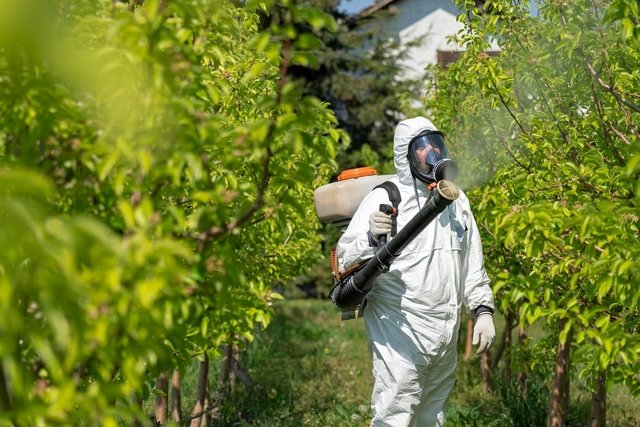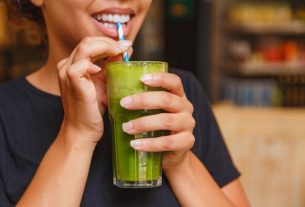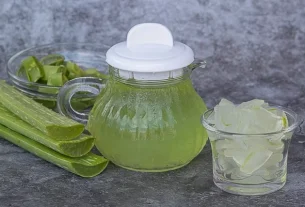Pesticides are chemical products used mainly in agriculture to kill, control or prevent the appearance of insects, larvae and fungi on plants, fruits and vegetables. Furthermore, pesticides can also be used to inhibit the growth of some plants.
In addition, pesticides can also be used for other purposes, such as to eliminate the dengue mosquito, spraying the product on cars known as “fumacê” in residential areas. Find out more about smoking and the health risks of the products.
Skin contact, ingestion or inhalation of pesticides can cause some health problems, such as headache, vomiting, dermatitis, kidney and liver damage or even more serious illnesses, such as Parkinson’s disease or cancer.

Possible health risks
Pesticides are normally used in specific locations, but they spread, contaminating not only the place where they are applied, but also the air, soil, water, animals, plants and people even if they are kilometers away.
Ingestion, inhalation or skin contact with different types of pesticides can cause short- or long-term poisoning and generate some health problems, such as:
Exposure to pesticides can cause health risks not only to animals and plants, but also to people who have direct contact with these products, such as those who work in the fields and those who work in health campaigns, using smoke cars, for example.
Furthermore, people who have indirect contact with pesticides, such as indigenous people or quilombolas, and even those who live in urban areas, consume water and food produced with pesticides daily and are also at risk of developing these health problems.
Amount of pesticides in food
To evaluate the amount of pesticides in food, the Pesticide Residue Analysis Program in Food was created by ANVISA in Brazil. The program assesses whether or not the amount of pesticides in food is above the maximum recommended intake, which varies for each type of pesticide.
The last analysis carried out by the program took place in 2017 and 2018, where 4616 samples of 14 foods were evaluated, including pineapple, lettuce, rice, garlic, sweet potato, beetroot, carrot, chayote, guava, orange, mango, pepper, tomato and non-organic grape.
A total of 2362 samples had pesticides and the foods that presented the highest risk of poisoning when consumed were:
- Pineapple;
- Sweet potato;
- Orange;
- Guava;
- Uva.
One of the types of pesticides found in food were carbofuran, glyphosate, tricyclazole, acephate, ometoate and abamectin.
How to avoid pesticides?
There are some ways to avoid or reduce the consumption of pesticides in food, also helping to prevent contamination of air, soil, water, and some health problems.
1. Prioritize organic, or agroecological, foods
In the production of organic or agroecological foods, other ways are normally used to combat insects, larvae and undesirable plants, such as solutions made with garlic, chives, rue, chili pepper or neem. Learn more about organic foods.
In these types of plantations, the producer normally uses plants with repellent properties; respects the right time to plant and harvest food; carries out biological control, using insects that are natural enemies of invasive insects; and uses natural fertilizer, with leaves and tree branches, for example.
2. Buy seasonal foods
Seasonal foods need fewer chemicals, such as fertilizers and fertilizers to grow, and require less pesticides as well. Therefore, buying foods that are in season is a good option to reduce the intake of pesticides and avoid contamination.
3. Purchase food from local producers
Small local producers typically grow small amounts of food, providing better control of insects and other plant invaders. Therefore, these types of foods often do not need pesticides during cultivation.
Another advantage of buying from local producers is that, as they do not require long hours of transportation, the food is fresher and is also grown and harvested during the harvest, which makes the food more tasty and nutritious.
Furthermore, this type of purchase facilitates direct contact with the producer, which helps to know the quality and way in which the food is produced.
4. Avoid processed foods
Many processed foods may contain wheat, corn, potatoes, oranges or other ingredients that are produced with pesticides, such as sliced bread, French fries, boxed orange juice or breakfast cereals.
In addition to the pesticides present in these types of foods, they are often also rich in fat, sugar or salt, contributing to other health problems, such as diabetes, high blood pressure and obesity.
5. Wash food
Washing food well under running water, in addition to removing residues such as soil or parasites, can also help reduce the level of pesticides present in the skins of fruits and vegetables. See how to properly wash vegetables and fruits.

Sign up for our newsletter and stay up to date with exclusive news
that can transform your routine!
Warning: Undefined array key "title" in /home/storelat/public_html/wp-content/plugins/link-whisper-premium/templates/frontend/related-posts.php on line 12
Warning: Undefined array key "title_tag" in /home/storelat/public_html/wp-content/plugins/link-whisper-premium/templates/frontend/related-posts.php on line 13




